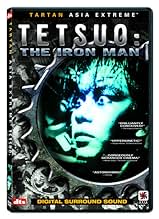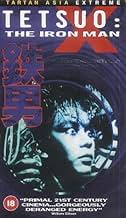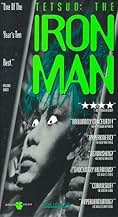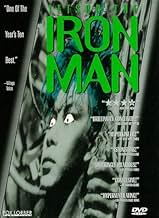Ein Geschäftsmann tötet versehentlich The Metal Fetishist, der sich rächt, indem er den Mann langsam in eine groteske Mischung aus Fleisch und rostigem Metall verwandelt.Ein Geschäftsmann tötet versehentlich The Metal Fetishist, der sich rächt, indem er den Mann langsam in eine groteske Mischung aus Fleisch und rostigem Metall verwandelt.Ein Geschäftsmann tötet versehentlich The Metal Fetishist, der sich rächt, indem er den Mann langsam in eine groteske Mischung aus Fleisch und rostigem Metall verwandelt.
- Auszeichnungen
- 2 wins total
Empfohlene Bewertungen
This is a very artsy and experimental film that is full of disturbing and phantasmagorical images. It is difficult to watch and follow at times. Best viewed as an experiment.
Tetsuo is, perhaps, the most brilliant film I have ever had the pleasure of witnessing. I feel that most viewers are not mature enough/experienced with extreme cinema to look beneath the superficial "story," of which there is very little, to appreciate the wealth of subtext lurking beneath the most mind-blowing and exhilarating hour and seven minutes ever committed to film.
At once, it is an allegory of technology in the modern age (and the dehumanizing effect it has on its unwitting victims), a commentary on the psycho-sexual fetishization of industrialization, a critique of vengeance and violence, a celebration of nihilism and the potential beauty of destruction, a deranged superhero fantasy, a metaphor for failed dreams, an indictment of sexual repression (including homosexuality) and, at its core, a modern day ghost story, in which a hit and run driver (of sorts; he does carelessly dump the metal fetishist's body in the woods) is haunted by his metal-obsessed, ambiguously homosexual, marathon runner victim, a crazed nihilist who has acquired the ability to manipulate metal with his mind after a piece of steel (from the car) became lodged in his brain during the accident. In this modern age, the fear of the afterlife and the spirit has been replaced with that of technology gone haywire, the fear of weapons falling into in the "wrong" hands and of a human creation rising up to overcome, overpower and, ultimately, destroy the humans responsible for it. The events of the film, when taken to be no more than the actual images depicted, are too disturbing, complex and, ultimately, too alien, for the average, unthinking audience member to make heads or tails of, and thus are insulted as pointless, "offensive" and "weird," as if these highly subjective concepts denote something inherent in the movie. If you are one who can handle complex films with fairly simple story lines told in a completely non-linear fashion (what we actual artists/filmmakers call USING THE ART FORM!), then, please, do yourself a favor and buy this film immediately! You will gain something new from it each time you view it (I have seen it over thirty times and am still learning!). If you, however, are unable to read (and read into) images (the currency with which the medium of film traffics), and are unable to handle "weird" things without being spoonfed clear cut "heros" and "villains," then rent/buy "Titanic" and leave complex films to the thinkers and artists and revel in your own ignorance, but do not put down Shinya Tsukamoto, a man who has won my undying respect with ONE film.
At once, it is an allegory of technology in the modern age (and the dehumanizing effect it has on its unwitting victims), a commentary on the psycho-sexual fetishization of industrialization, a critique of vengeance and violence, a celebration of nihilism and the potential beauty of destruction, a deranged superhero fantasy, a metaphor for failed dreams, an indictment of sexual repression (including homosexuality) and, at its core, a modern day ghost story, in which a hit and run driver (of sorts; he does carelessly dump the metal fetishist's body in the woods) is haunted by his metal-obsessed, ambiguously homosexual, marathon runner victim, a crazed nihilist who has acquired the ability to manipulate metal with his mind after a piece of steel (from the car) became lodged in his brain during the accident. In this modern age, the fear of the afterlife and the spirit has been replaced with that of technology gone haywire, the fear of weapons falling into in the "wrong" hands and of a human creation rising up to overcome, overpower and, ultimately, destroy the humans responsible for it. The events of the film, when taken to be no more than the actual images depicted, are too disturbing, complex and, ultimately, too alien, for the average, unthinking audience member to make heads or tails of, and thus are insulted as pointless, "offensive" and "weird," as if these highly subjective concepts denote something inherent in the movie. If you are one who can handle complex films with fairly simple story lines told in a completely non-linear fashion (what we actual artists/filmmakers call USING THE ART FORM!), then, please, do yourself a favor and buy this film immediately! You will gain something new from it each time you view it (I have seen it over thirty times and am still learning!). If you, however, are unable to read (and read into) images (the currency with which the medium of film traffics), and are unable to handle "weird" things without being spoonfed clear cut "heros" and "villains," then rent/buy "Titanic" and leave complex films to the thinkers and artists and revel in your own ignorance, but do not put down Shinya Tsukamoto, a man who has won my undying respect with ONE film.
It's so visually striking that you could never fully describe Tetsuo in words. But here are a few that apply: Japanese, hyperactive, perverse, industrial, surreal, Faustian bargain, contrasty, black-and-white, Kafkaesque, scifi, stop-motion, manga-influenced, revenge, technology, alienation, supervillains.
Shinya Tsukamoto is an actor (he's the antagonistic "Metals Fetishist" here as well as Jijii in Ichi the Killer) as well as a ground-breaking writer/director/cinematographer. Tetsuo's influence can be seen clearly in directors as diverse as Darren Aronofsky, Takashi Miike, and even David Cronenberg.
There is definitely a plot, but due to the non-linear editing and sparsity of dialogue you'll need to pay close attention on a first viewing or else you'll be overwhelmed by the engrossing visual style (which might be a good thing). It's filmed in contrasty black-and-white. Each frame is cramped and chaotic, much of the time it's filled with wires, pipes, chain-link fences, and all the other incidental debris of life in the late 20th century... which suddenly seems significant and even menacing.
Towards the fifty-minute mark (it's 67 min. total) the willful excess starts to feel a little too excessive, perhaps the manga influence is a bit too strong. But Tetsuo finishes strong, with an end that's at once unexpected and inevitable. Highly recommended.
Shinya Tsukamoto is an actor (he's the antagonistic "Metals Fetishist" here as well as Jijii in Ichi the Killer) as well as a ground-breaking writer/director/cinematographer. Tetsuo's influence can be seen clearly in directors as diverse as Darren Aronofsky, Takashi Miike, and even David Cronenberg.
There is definitely a plot, but due to the non-linear editing and sparsity of dialogue you'll need to pay close attention on a first viewing or else you'll be overwhelmed by the engrossing visual style (which might be a good thing). It's filmed in contrasty black-and-white. Each frame is cramped and chaotic, much of the time it's filled with wires, pipes, chain-link fences, and all the other incidental debris of life in the late 20th century... which suddenly seems significant and even menacing.
Towards the fifty-minute mark (it's 67 min. total) the willful excess starts to feel a little too excessive, perhaps the manga influence is a bit too strong. But Tetsuo finishes strong, with an end that's at once unexpected and inevitable. Highly recommended.
This movie can be explored in many ways: the relationship between human life and technology is the first which comes to mind. Then maybe this fits into a larger theme of industrialization. Still, there are several ways of interpreting each scene and at times I had the feeling that they try to show - or to produce a metaphor for - human emotions, such as cheating, sorrow, the will not to die alone. "And we can rust the whole world and scatter it into the dust of universe" You will certainly make what you want of this movie. You may understand that technology is evil, that industrialization takes our souls away, or that even in our worst moments we crave for closeness and we don't want to be alone. This is a special movie - so beware - it is not accessible to most people. There's a chance that you won't be able to think for yourself and that you'll expect some quick & nice Hollywood conclusions which you're not going to get - in which case, this movie will be a waste of your time.
Wusstest du schon
- WissenswertesThe film was based on a play that Shin'ya Tsukamoto had written, directed and performed in college.
- Zitate
Metals Fetishist: Together, we can turn this fucking world to rust!
- Crazy Credits(after end credits) GAME OVER
- Alternative VersionenTetsuo The First Cut is an extended version released on DVD, running 10 minutes longer than the original 67 minute running time.
- VerbindungenEdited into Gli ultimi giorni dell'umanità (2022)
Top-Auswahl
Melde dich zum Bewerten an und greife auf die Watchlist für personalisierte Empfehlungen zu.
Details
- Erscheinungsdatum
- Herkunftsland
- Sprache
- Auch bekannt als
- Tetsuo: el hombre de hierro
- Produktionsfirmen
- Weitere beteiligte Unternehmen bei IMDbPro anzeigen
- Laufzeit1 Stunde 7 Minuten
- Farbe
- Seitenverhältnis
- 1.37 : 1
Zu dieser Seite beitragen
Bearbeitung vorschlagen oder fehlenden Inhalt hinzufügen



























